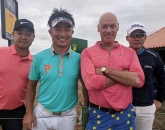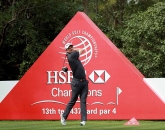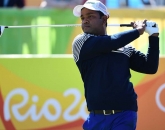 As refreshing as it is to witness the emergence of an exciting new kid on the block, it’s even more pleasing when the player in question has risen from a challenging background or a country where golf is not recognised as a mainstream sport. Jhonattan 'Johnny' Vegas, the 2011 Bob Hope Classic winner, is the latest in this category and has burst to prominence from what you might term an ‘emerging’ golf nation: Venezuela.
As refreshing as it is to witness the emergence of an exciting new kid on the block, it’s even more pleasing when the player in question has risen from a challenging background or a country where golf is not recognised as a mainstream sport. Jhonattan 'Johnny' Vegas, the 2011 Bob Hope Classic winner, is the latest in this category and has burst to prominence from what you might term an ‘emerging’ golf nation: Venezuela.
Vegas’ undoubted superstar potential may see a new generation of Venezuelans dedicate themselves to the sport in his country, although President Hugo Chavez's distaste for the game – he has described golf as a "bourgeois sport" and has threatened to close two of Caracas's better- known courses – doesn't necessarily bode well on that front.
Regardless, Vegas follows many others that have gone before him by single-handedly flying the flag for their countries at the highest echelons of professional golf. Carlos Franco from Paraguay burst to prominence on the PGA Tour over a decade ago, Camilo Villegas is doing the same thing for Columbia right now, while Zhang Lian-wei, China's golfing trailblazer, has also played his part. Special mention to Yani Tseng, who has reached the very pinnacle of the women's game despite being Chinese Taipei's sole representative in the top 50 of the world rankings.
But as Se Ri Pak proved, it only takes one to lead the way and for a spark to be lit. Pak's dominance on tour, from 1998 to 2003, has given rise to dozens of talented young Koreans who now ply their trade on the LPGA. We will watch for the emergence of home-grown golfing pioneers from places like Vietnam, Turkey and Nigeria, for surely they will come. Commencing her fifth season on the Ladies European Tour is perhaps the most unlikely of these pioneers, Russia's Maria Verchenova. Her arrival on the world stage is an unlikely story in terms of the cruel realities of the weather in her homeland, which renders golf unplayable for six months of the year. Compounding this and, perhaps more critically, is the most basic lack of resources – i.e. golf courses – at her disposal, the scarcity of professional coaching and the generally poor level of competition at any age group when she was learning the game.
While it is slowly getting better, golf in Russia is by all accounts akin to cricket in China. If you look hard enough you can find it being played somewhere by a few diehards, but by no means it is part of popular culture or accepted as a grassroots sport. Kids simply don't play it because their parents did.
“I didn’t even know what golf was when I was young because my family was poor and everybody in Russia is focused on tennis,” she says. “But thanks to my parents I was given a chance.”
That chance came when on holiday in the Czech Republic as a 12-year-old.
“My dad took me for coffee at a golf club,” she explains. “The next day we went back and I tried hitting a few balls with a local coach. He said I had a talent for the game and I should play. When I got back we went to Moscow City Golf Club and that’s how I started.”
Pages
Click here to see the published article.











